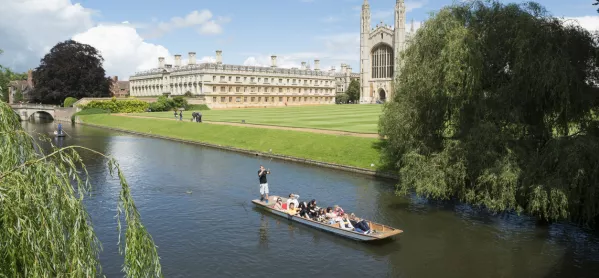Hundreds of state school A-level students will be given additional tuition by University of Cambridge academics as part of a pilot scheme to mitigate educational disruption caused by the pandemic.
The 17-month programme for around 750 maths, physics and chemistry students will include online tutorials, small group supervisions, mentoring and a residential stay at a Cambridge college.
From January, students will be supported through the STEM SMART scheme from the second term of Year 12 to their Year 13 A-level examinations in a bid to help bridge attainment gaps caused by Covid-19.
Covid recovery: Catch-up tutoring to be led by private outsourcing firm
Research: UK pupils lost third of learning time during pandemic
A levels 2021: Rising disadvantage gap for poor students
The pilot programme also aims to build confidence in disadvantaged students and encourage them to apply to study engineering or physical sciences at leading universities, including Cambridge.
Covid catch-up: Cambridge tutors will support A-level students
Students who take part in the scheme will be invited to stay at a college in the city for four days, where they will experience life as a Cambridge student.
Most selective universities are under pressure to improve access to higher education for different groups of students, including those from disadvantaged backgrounds.
Last month, early admissions data from the university suggested that around 72 per cent of UK undergraduates entering the University of Cambridge will have been educated in the state sector, up from 70.6 per cent in 2020.
Nearly 45 per cent of A-level entries across the UK were awarded top grades this summer.
State school students who are eligible for the scheme are likely to live in areas of high deprivation, have been entitled to free school meals during secondary schooling, be care-experienced or attend schools unable to offer further mathematics as an A level.
Stephen Toope, vice-chancellor at Cambridge, said: “Covid continues to exacerbate existing inequalities in education, and many schools face an unprecedented challenge dealing with the legacy of the pandemic.
“As part of the university’s mission to contribute to society through the pursuit of learning, the STEM SMART programme will bolster the studies of A-level students at non-fee-paying schools, from their first year all the way through to their exams.
“This is support for those talented students who need it most, at a time when it is needed more than ever.”
Eligible students will normally have achieved at least a grade 7 (A) in GCSE maths and at least grades 66 (BB) in double science GCSE or grade 6 (B) in physics and grade 6 (B) in chemistry as separate sciences.
In June, the Department for Education announced an additional £1.4 billion of funding, on top of the £1.7 billion already pledged for catch up, to help pupils in England make up for lost learning.
Sir Kevan Collins, the former education catch-up commissioner, resigned over the government’s £1.4 billion fund, describing it as “a bit feeble”. He had proposed a £15 billion recovery package for education.
David Buckley, head of physics at Mayflower High School in Billericay, Essex, said: “Our students have had an unprecedented, difficult time in their education, so this additional tuition - the extra time and detail that teachers want to give but because of the demands of the job sometimes can’t - is hugely welcome, particularly now.
“Being able to meet and work with Cambridge University experts and current Cambridge undergraduates, to see how they approach particular problems, and find out about life around their courses, really is a unique opportunity for our students.”





